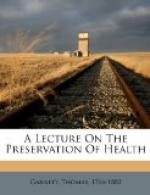If we examine separately the different exciting powers, which act on the body, we shall find abundant confirmation of this law. Let us first consider Light; if a person be kept in darkness for some time, and be then brought into a room in which there is only an ordinary degree of light, it will be almost too oppressive for him, and appear excessively bright; and if he have been kept for a considerable time in a very dark place, the sensation will be very painful. In this case, while the retina, or optic nerve, was deprived of light, its excitability accumulated, or became more easily affected by light; for if a person goes out of one room, into another which has an equal degree of light, he will feel no effect. You may convince yourselves of this law by a very simple experiment—shut your eyes, and cover them for a minute or two with your hand, and endeavour not to think of the light, or of what you are doing; then open them, and the day-light will for a short time appear brighter. If you look attentively at a window, for about two minutes, and then cast your eyes upon a sheet of white paper, the shape of the window-frames will be perfectly visible upon the paper; those parts which express the wood-work, appearing brighter than the other parts. The parts of the optic nerve on which the image of the frame falls, are covered by the wood-work from the action of the light; the excitability of these portions of the nerve will therefore accumulate, and the parts of the paper which fall upon them, must of course appear brighter. If a person be brought out of a dark room where he has been confined, into a field covered with snow, when the sun shines, it has been known to affect him so much, as to deprive him of sight altogether.
Let us next consider what happens with respect to heat; if heat be for some time abstracted, the excitability accumulates; or in other words, if the body be for some time exposed to cold, it is more liable to be affected by heat, afterwards applied; of this also you may be convinced by an easy experiment—put one of your hands into cold water, and then put both into water which is considerably warm; the hand which has been in cold water, will feel much warmer than the other. If you handle some snow with one hand, while you keep the other in your bosom, that it may be of the same heat as the body, and then bring both within the same distance of the fire, the heat will affect the cold hand infinitely more than the warm one. This is a circumstance of the utmost importance, and ought always to be carefully attended to. When a person has been exposed to a severe degree of cold for some time, he ought to be cautious how he comes near a fire, for his excitability will be so much accumulated, that the heat will act violently; often producing a great degree of inflammation, and even sometimes mortification. We may by the way observe, that this is a very common cause of chilblains, and other inflammations. When the hands, or any other parts of the body have been exposed to violent cold, they ought first to be put into cold water, or even rubbed with the snow, and exposed to warmth in the gentlest manner possible.




